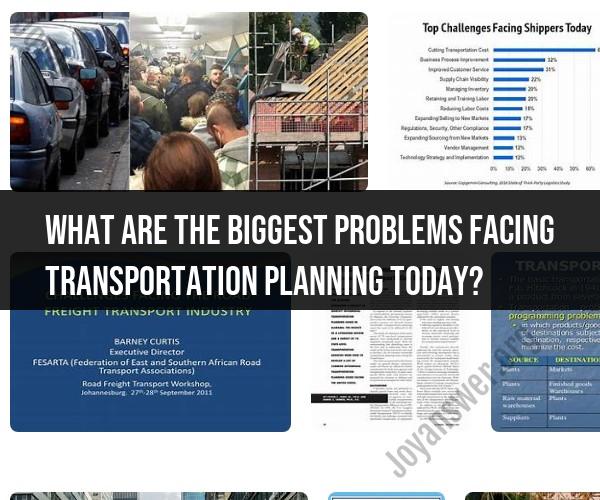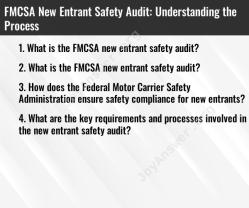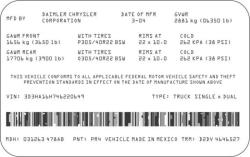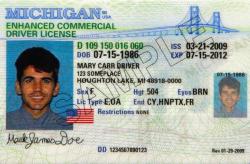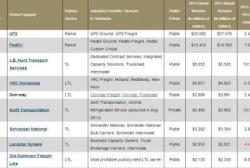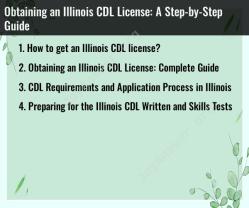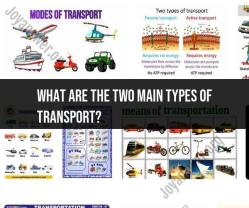What are the biggest problems facing transportation planning today?
Transportation planning faces several significant challenges today, which can vary by region and context but often include the following key issues:
Traffic Congestion: Traffic congestion is a pervasive problem in urban areas worldwide. It leads to longer commute times, increased air pollution, and decreased overall quality of life. Addressing congestion requires innovative solutions such as improved public transportation, congestion pricing, and investments in smart traffic management systems.
Infrastructure Maintenance and Aging: Many countries have aging transportation infrastructure, including roads, bridges, and transit systems. The challenge is not only maintaining these assets but also upgrading them to accommodate population growth and changing mobility needs. Funding for infrastructure improvements is a common issue.
Environmental Sustainability: Transportation is a major contributor to greenhouse gas emissions and air pollution. Reducing the environmental impact of transportation is a pressing concern. Strategies include promoting electric vehicles, expanding public transit, and investing in sustainable transportation options like cycling and walking.
Equity and Accessibility: Ensuring that transportation systems are equitable and accessible to all is a critical challenge. Many communities, particularly low-income and marginalized groups, face limited access to affordable and convenient transportation options. Transportation planners must work to provide accessible services and address disparities.
Technological Advancements: The rapid advancement of technology, including autonomous vehicles and ride-sharing services, is changing the transportation landscape. Planning for the integration of these technologies while addressing safety, privacy, and regulatory concerns is a complex issue.
Funding Shortages: Securing funding for transportation projects is often a hurdle. Many transportation systems rely on government funding, which can be limited or subject to political fluctuations. Identifying sustainable funding sources and securing long-term investments are ongoing challenges.
Resilience and Climate Change: Transportation infrastructure is vulnerable to extreme weather events and climate change impacts. Building resilient systems that can withstand these challenges and mitigate their effects is a growing concern.
Urbanization and Land Use: Urbanization continues to shape transportation planning. As cities grow, planners must consider how to accommodate increased density while minimizing congestion and promoting sustainable transportation options.
Data and Technology Integration: Harnessing data and technology for improved transportation planning and management is essential. This includes using real-time data for traffic management, route optimization, and demand forecasting.
Public Engagement and Stakeholder Collaboration: Engaging the public and various stakeholders in the planning process is crucial for successful transportation projects. Achieving consensus and addressing community concerns can be challenging but is vital for project acceptance.
Policy and Regulation: Navigating complex transportation policies and regulations at local, state, and federal levels is a constant challenge. Regulations often need to adapt to accommodate new technologies and trends.
Transportation planners and policymakers are working to address these challenges through a combination of innovative solutions, funding strategies, and collaborative efforts with various stakeholders. Achieving sustainable, efficient, and equitable transportation systems is a complex but vital goal for the future.
Contemporary Challenges in Transportation Planning: Key Issues and Solutions
Transportation planning is the process of developing and implementing strategies to meet the needs of people and businesses for transportation services. Transportation planners face a number of challenges, including:
- Congestion: Traffic congestion is a major problem in many cities around the world. It can lead to delays, air pollution, and increased fuel consumption.
- Infrastructure: Transportation infrastructure, such as roads, bridges, and public transit systems, is aging and in need of repair. This can lead to safety hazards and disruptions to service.
- Equity: Transportation systems should be accessible and affordable for everyone, regardless of income, race, or ethnicity. However, this is not always the case.
Solutions to these challenges include:
- Investing in public transit: Public transit is a more efficient and sustainable way to move people than cars. Investing in public transit can help to reduce congestion and air pollution.
- Improving infrastructure: Transportation infrastructure needs to be upgraded and maintained to meet the needs of a growing population. This includes investing in new roads, bridges, and public transit systems.
- Making transportation more affordable: Transportation costs can be a significant burden for low-income households. Making transportation more affordable can help to improve equity and access to jobs and other opportunities.
The Evolving Landscape of Transportation Planning: Current Problems and Trends
The landscape of transportation planning is constantly evolving. New technologies, such as self-driving cars and ride-hailing apps, are changing the way people travel. Transportation planners need to be able to adapt to these changes and develop strategies that meet the needs of a changing world.
Current problems in transportation planning include:
- Climate change: Transportation is a major contributor to climate change. Transportation planners need to develop strategies to reduce greenhouse gas emissions from transportation.
- Urbanization: More and more people are moving to cities. This is putting a strain on transportation systems. Transportation planners need to develop strategies to meet the needs of a growing urban population.
- Technology disruption: New technologies are changing the way people travel. Transportation planners need to be able to adapt to these changes and develop strategies that take advantage of new technologies.
Trends in transportation planning include:
- Smart cities: Smart cities are using technology to improve transportation efficiency and reduce congestion. For example, smart cities are using sensors to collect data on traffic conditions and to adjust traffic signals accordingly.
- Shared mobility: Shared mobility services, such as ride-hailing apps and bike-sharing programs, are becoming increasingly popular. Transportation planners need to develop strategies to integrate shared mobility services into existing transportation systems.
- Multimodal transportation: Multimodal transportation refers to using multiple modes of transportation, such as walking, biking, public transit, and driving, to get around. Transportation planners are developing strategies to make it easier for people to use multimodal transportation.
Addressing 21st Century Transportation Issues: The Role of Planning
Transportation planning plays a vital role in addressing 21st century transportation issues. Transportation planners can develop strategies to reduce congestion, improve infrastructure, and make transportation more affordable and accessible.
Transportation planners also play a role in addressing climate change and urban sprawl. Transportation planners can develop strategies to reduce greenhouse gas emissions from transportation and to promote sustainable development.
Transportation planning is a complex and challenging field, but it is essential for meeting the needs of a growing population in a changing world. Transportation planners play a vital role in creating a more sustainable and equitable transportation system for everyone.
